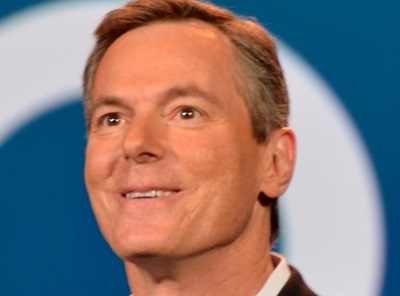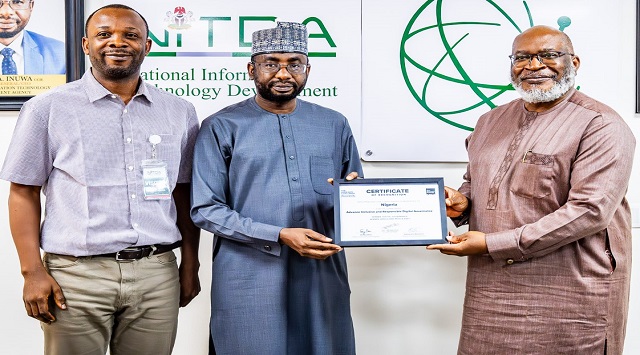News
NCC Prioritizes Broadband, to Remove Barriers

The federal government has made it a “personal priority” to bring Nigeria to the forefront of broadband service, a remarkable pledge which if implemented could fuel economic development, Nigeria CommunicationsWeek can now report.
Nigeria currently scores very low in availability and affordability scales for broadband services even with the numerous submarine cable initiatives with landing points on the shores of the country.
And while other countries including less endowed nations are starting to invest in new, fibre-based infrastructure, delivering considerably higher bandwidth, Nigeria is tottering under the weight of distribution challenges.
The challenges include; lack of adequate national transmission backbone; unavailability of spectrum for last mile connectivity; low demand for broadband; and lack of local content and e-services.
Others are absence of broadband policy; unreliable electricity supply; and vandalization of equipment.
Lack of policy means there is no clear roadmap for spectrum planning, particularly with the harvesting of the digital dividend spectrum.
But the Nigerian Communications Commission (NCC) is to make regulatory intervention including incentives for broadband network roll out.
Nigeria CommunicationsWeek gathered that in the absence of reliable statistics, broadband penetration of Nigeria is said to be about 6 per cent.
Dr. Eugene Juwah, executive vice chairman, NCC, said that high speed internet is a new engine of growth and job creation and that his commission is to intervene by deepening broadband penetration in the country by taking the technology to a larger segment of the Nigerian society.
Speaking at the Nigerian Broadband Forum held in Lagos last week, Juwah said “the consumption needs for ICT products are so vast and availability so infinitesimal” resulting in “an overwhelming opportunity for investment, much like the pre-GSM era.”
Juwah said efforts are being made by the Nigerian government including the states to welcome more participation and investments in the telecoms industry.
Before now, the NCC came up with initiatives such as the State Accelerated Broadband Initiative (Sabi) and Wire Nigeria Initiative (Win) to deepen broadband penetration in the country but they failed to impact due to lack of a broadband policy to give a direction on their execution.
Raising hopes, Juwah affirmed that there can be no adequate broadband without fixed infrastructure, adding that the 2.5GHZ which is under the custody of the broadcast community in different slots would be opened up as broadcasters are to vacate the frequency in 2015 as a result of digitization.
By this, he said huge frequencies would be available for LTE come 2015, noting that the broadband penetration initiative would be a win-win situation for operators and subscribers as there would be sufficient base stations to aggregate mobile traffic.
Omobola Johnson, minister of Communication Technology noted that: “The challenge for us in Nigeria is not the proverbial last mile but the last hundreds of miles- taking that landed capacity to cities, communities, institutions and homes.”
She said the average broadband speeds today are slow and with a penetration rate of just 6 percent or thereabout, “it is not ubiquitous-demand has already far outstripped supply.”
Johnson opined that clear government policy, effective and independent regulation that attracts investments and fueled the country’s success in voice will fuel the success of broadband services delivery in Nigeria.
According to the communications minister, objectives for broadband penetration in the country are to accelerate the penetration of reasonably priced broadband internet in the country, foster broadband usage for national development and to ensure the rapid development of a broadband policy support and implementation framework.
News
NITDA Partners OGP to Drive Presidential Digital Goals

The Director General of the National Information Technology Development Agency (NITDA), Kashifu Inuwa, CCIE, has reaffirmed Nigeria’s commitment to open governance, transparency and inclusive digital development as the Open Government Partnership (OGP) team formally presented the award and certificate received at the OGP Global Summit Spain 2025 to the Agency’s leadership.

Nigeria emerged as the overall global winner in the Digital Governance category in recognition of the country’s excellence in deploying digital tools and policies to strengthen government transparency, accountability, and citizen engagement. In addition, Nigeria received the Regional Award for advancing Open Digital Governance across Africa and the Middle East, reaffirming its leadership role in promoting open government principles and driving digital transformation across the region.
These recognitions were largely attributed to initiatives led by NITDA in collaboration with civil society partners, such as Dataphyte, which showcased innovative and inclusive approaches to digital governance at the summit.
The summit, which was organised in Vitoria-Gasteiz, Spain, brought together more than 1,500 high-level representatives of governments, civil society leaders, and policymakers from around the world to exchange experiences, best practices, and progress on open government initiatives and implementation on key issues.
Receiving the OGP delegation at NITDA, Inuwa described the recognition as a national honour rather than an institutional one, stressing that the award reflects Nigeria’s collective efforts across government, civil society and the private sector in advancing open governance principles through the digital space.
According to him, such global recognition comes with heightened responsibility to deliver on commitments made under the OGP framework.
“This is not just about NITDA. It is a national recognition, and every recognition comes with responsibility,” the DG said.
“If we fail to execute the commitments we have made, it will not only affect our image locally but also at the international stage. This is also not something NITDA can do in isolation,” he added.
Inuwa linked the achievement directly to the Renewed Hope Agenda of President Bola Ahmed Tinubu, noting that digital transformation, transparency, economic diversification, job creation and efficient public service delivery remain central presidential priority areas.
He emphasised that leveraging digital technologies to deepen openness and accountability aligns with national objectives of strengthening institutions, improving governance outcomes and building trust between government and citizens.
Highlighting the importance of collaboration, the NITDA boss underscored the role of the OGP platform as a catalyst for a strong multi-stakeholder approach in Nigeria’s digital ecosystem.
He called on civil society organisations, development partners, the private sector and other government institutions to provide technical expertise, guidance and sustained engagement to ensure effective implementation of agreed commitments.
“We need to leverage the OGP platform. We need your expertise, your guidance, your support and your commitment to hand-hold us in delivering on these commitments,” he said.
He further noted that “a multi-stakeholder approach in the digital space is critical to fostering a resilient ecosystem that delivers real value to citizens.”
Inuwa disclosed that NITDA has already begun internal reviews of its OGP commitments and has tasked its representatives, including Dr Rousseau, to work with colleagues to develop a clear execution strategy.
He proposed the creation of joint work streams with OGP stakeholders to support implementation, ensure accountability and keep all parties on track.
“We are humans. Oversight and collaboration help us stay focused. With commitment, nothing is impossible, and I believe these goals are achievable,” he added, assuring the delegation of NITDA’s readiness and political will to deliver on all agreed commitments.
Inuwa also welcomed the idea of engaging the political leadership of OGP, including the Honourable Minister of Budget and Economic Planning, with a view to briefing President Tinubu on the achievement. He noted that celebrating milestones is important, as it reinforces morale and demonstrates that Nigeria’s efforts in digital governance are gaining global recognition.
“It’s also good when there are wins, we should celebrate, because we too never knew that the little things we are doing are noticed not just within Nigeria, but globally, to the extent of earning us this award,” he asserted.
He concluded by expressing gratitude to the Nigerian National OGP Secretariat and the global OGP leadership, reaffirming NITDA’s commitment to strengthening collaboration and building a more productive working relationship that will translate open governance principles into measurable national impact.
Earlier in his remark, Mr Olusoji Apampa, who led the OGP deelegation, said the honours were earned through a strong partnership between government and civil society, with NITDA playing a critical role, particularly in commitments focused on improving digital governance in Nigeria.
Apampa expressed hope that the awards would serve as added momentum to deepen ongoing commitments under NITDA’s leadership and accelerate the practical implementation of reforms aimed at strengthening digital governance across the country.
News
PalmPay Launches N400 Million World Travel Carnival, Rewarding Users with Free Global Trips

PalmPay, Nigeria’s leading digital banking platform, has announced the launch of its ₦400 million festive rewards campaign, designed to reward users with cash prizes and fully sponsored international travel experiences for everyday transactions on the PalmPay app.

The campaign will run from December 17, 2025, to January 8, 2026. The campaign is designed to reward everyday transactions with extraordinary experiences. It runs alongside PalmPay’s Purple December brand campaign, which focuses on wrapping up the company’s key brand and community initiatives for the year.
At the centre of the rewards campaign is the PalmPay World Travel Carnival, an interactive card collection experience that allows users to earn city cards by completing transactions on the app. Users are required to collect five city cards – London, New York, Dubai, Sydney, and Cape Town and combine them into a World Card, which unlocks a share of the prize pool.
The more World Cards a user creates, the larger their share of the cash rewards. Any extra uncombined cards can be swapped with friends and other PalmPay users to help complete additional World Cards.
Beyond cash rewards, the Carnival also offers Free Global Trips. In each round, the top two users with the highest number of eligible transactions (₦100 and above) and at least one World Card will win an all-expense-paid international trip.
The travel grand prize covers:
- Visa fees
- Round-trip international airfare
- 5-day, 4-night hotel accommodation
- Side attraction
- Meal expenses
- Airport pick-up and drop-off
- All transportation for scheduled tour activities during the trip
Winners will be determined through a transparent leaderboard system, with prizes credited automatically at the end of each round on December 25, December 31, and January 8.
Participation is simple:
- Complete tasks on the PalmPay app, such as Airtime, Data, Transfers, and other specific transactions listed in the app, to earn cards.
- Collect all five city cards.
- Swap cards with friends to complete your collection.
- Combine cards to form a World Card and earn cash rewards.
- Perform more transactions to climb the leaderboard for a chance at the global trip prize.
To ensure fairness, PalmPay has instituted strict rules: no cheating, bots, fake accounts, or manipulation. Any violations may lead to disqualification or account bans. Additionally, the Free Travel Prize is limited to one per user throughout the campaign.
Speaking on the launch, Femi Hanson, Head of Marketing & Communication, “This festive rewards campaign is about turning everyday banking into meaningful value for our users. With the World Travel Carnival as the headline activation, we are reinforcing PalmPay’s promise of being the smarter way to bank—where smart financial decisions unlock bigger opportunities.”
News
REA, NBS Partner to Deliver Comprehensive Energy Data for Nigeria

The Rural Electrification Agency (REA) and the National Bureau of Statistics (NBS) have signed a Memorandum of Understanding (MoU) to conduct a nationwide energy survey aimed at closing long-standing data gaps in Nigeria’s power sector. The initiative is expected to guide policy, attract investment, and accelerate universal electricity access.

Signed in Abuja, the agreement establishes a National Energy Survey based on the Multi-Tier Tracking Framework (MTF), a globally recognized methodology that measures electricity access not only by grid connection but also by quality, affordability, reliability, and usage of electricity and clean cooking solutions.
The survey will be implemented under the Energy Sector Management Assistance Program (ESMAP) of the World Bank. Dr. Abba Aliyu, REA Managing Director/CEO, said the partnership underscores REA’s commitment to evidence-based rural electrification planning and will generate detailed insights on electricity access and off-grid solutions nationwide.
Prince Adeyemi Adeniran, Statistician-General of the Federation/CEO of NBS, emphasized that reliable statistics are essential for effective policymaking, assuring that NBS will provide technical oversight, sampling expertise, and quality assurance to meet global standards.
The survey will assess energy access, household affordability, expenditure patterns, and the adoption of off-grid technologies such as solar home systems, mini-grids, and clean cooking solutions. REA will provide sector expertise and policy alignment, while NBS manages regulatory approvals, methodology, and technical supervision.
Funded and technically overseen by the World Bank, the exercise will run for 18 months, with the resulting data expected to improve national energy planning, programme targeting, and private sector investment, particularly in underserved and rural communities.
Officials said the collaboration reflects the Federal Government’s commitment to strengthening inter-agency coordination, enhancing energy data availability, and advancing Nigeria’s goal of universal electricity and clean cooking access.

 E-Business2 days ago
E-Business2 days agoNigeria Police Arrest Okitipi, Nigerian Allegedly Linked to Microsoft 365 Hack

 E-Financial2 days ago
E-Financial2 days agoWorld Bank to Approve $500m Loan for Nigeria Today

 News2 days ago
News2 days agoNITDA Partners OGP to Drive Presidential Digital Goals

 E-Financial2 days ago
E-Financial2 days agoCustoms Slam 3 Percent Surcharge on Banks over Delayed Revenue Remittance

 Telecom2 days ago
Telecom2 days agoWhy Econet Wireless is Switching to VFEX

 E-Financial2 days ago
E-Financial2 days agoFidelity Bank Boosts Maternal, Child Healthcare @ESUTH

 General News1 day ago
General News1 day agoJumia Kicks Off December Holiday Sale, Bringing Festive Deals to Shoppers Nationwide

 E-Financial1 day ago
E-Financial1 day agoAccess Holdings Shareholders Approved to Raise N40bn Capital Through Private Placement

























